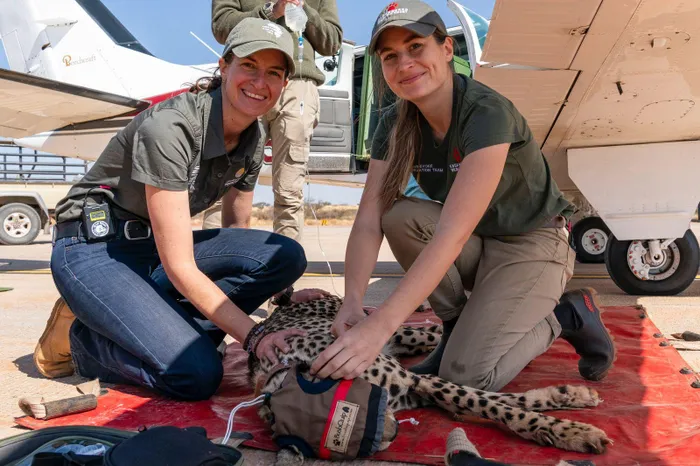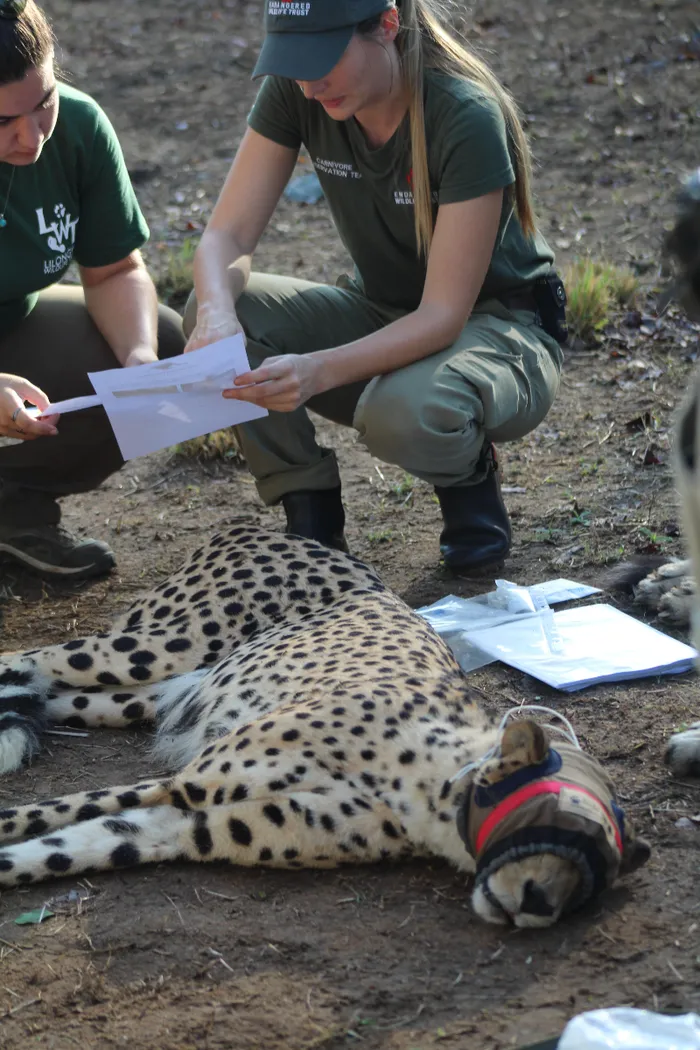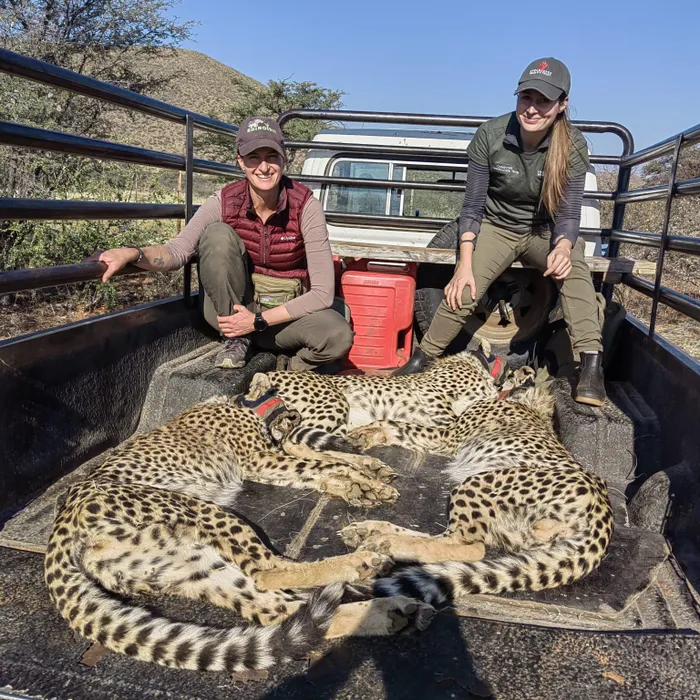Cheetahs have ‘safe space’ in Sievert’s heart

Olivia Sivert (right), Cheetah Range Expansion project coordinator and coordinator of the Cheetah Advisory Group at the Endangered Wildlife Trust (EWT), says Women’s Month serves as an important reminder for organisations to reflect on how they can support long-term career growth for women in conservation.
Image: Supplied
Getting more women into conservation is only the first step, keeping them there is the real challenge.
A 2019 World Wildlife Fund report titled Life on the Frontline found that in Africa, men made up the overwhelming majority of the wildlife ranger workforce - 88.8%, compared to just 11.2% women. This imbalance persists beyond field roles. While women now represent more than half of all conservation science graduates, many say they rarely see people who look like them in leadership positions.
Olivia Sievert, Cheetah Range Expansion project coordinator and coordinator of the Cheetah Advisory Group at the Endangered Wildlife Trust (EWT), says Women’s Month serves as an important reminder for organisations to reflect on how they can support long-term career growth for women in conservation.
“Conservation is a male-dominated field, especially at the top levels and this is even more the case with large carnivore conservation. As a result, I have experienced people underestimating my capabilities as a woman especially when it comes to working remotely in the bush. Even though I have led successful projects in some incredibly remote areas, I continued to be underestimated and at times undermined by men in the industry.
"Early in my career, breaking into certain opportunities felt harder because I wasn’t part of the 'boys club' with many decisions happening informally over a weekend braai. I had to push myself to speak up, back my ideas, and not compromise on my values or knowledge. It was outside my comfort zone, but it was necessary to progress and be taken seriously,” she said.

Olivia Sivert with captured cheetah for translocation.
Image: Supplied
Sievert emphasised that beyond getting women into conservation, “we also need to focus on retaining them. That means creating safe, supportive, and inclusive work environments”.
The 33-year-old originally from Halifax, Canada said that while she grew up in love with wildlife, her path to conservation was “anything but strategically planned”.
“I loved being in nature and working with wildlife, so I took any opportunities I could, often balancing them with university studies and waiting tables at two different restaurant jobs. At university, I volunteered with a conservation lab that used detection dogs to find hibernation sites for endangered reptiles, and I worked at a wildlife rehabilitation centre once a week.
“After graduating, I was lucky enough to get an opportunity working for three months at a wildlife rehab centre in Malawi. It was a case of being in the right place at the right time, Malawi was experiencing a conservation boom, and opportunities kept opening up. Before I knew it, three years had passed, and I was working as a monitor for a cheetah reintroduction project in Liwonde National Park. That’s where my love for cheetahs began. I went on to complete a master’s in Conservation Ecology on that very project, and in 2023, after over eight years of working in Malawi on everything from vervet monkeys to vultures to pangolins, I was fortunate to join the Endangered Wildlife Trust, coordinating their cheetah conservation work.”

Olivia involved in a translocation project.
Image: Supplied
This is also one of the standout projects in Sievert’s career where in 2017 she was part of the reintroduction of cheetahs to Malawi’s Liwonde National Park, a collaborative effort between the Endangered Wildlife Trust (EWT), African Parks, and Malawi’s Department of National Parks and Wildlife. As the project’s monitor, she tracked each individual cheetah daily, observing how they adapted to their new environment, successfully raised cubs, and ultimately established a second generation. Today, the population has grown to over 21 individuals, “ a real conservation success”, she said.
Later, in her role at EWT, Sievert was invited by the park to help strengthen the genetic diversity of the population by sourcing and relocating new female cheetahs from South Africa to Malawi. From identifying suitable individuals to overseeing their translocation, the project marked a “full-circle moment” in her conservation journey.
She explained cheetahs play a vital role in their ecosystems, but like many species, are disappearing quietly.
“It’s surprising that such an iconic African species, a symbol for teams, companies, and culture, could be on the brink without many realising it. Protecting cheetahs means protecting their habitat, which also safeguards countless other species and entire ecosystems.
“In conservation we are constantly responding to human caused threats to our natural world whether intentional or not. For cheetah, one of the biggest threats faced globally is the low population size and major loss of their historic habitat and range (they exist in less than 9% of their historic range). While we are fortunate to have major restoration work being undertaken in protected areas across the continent, growing cheetah populations are few and far between and often too far away to allow any natural recolonisation of these areas. This means, it is unlikely that we will see an impactful growth of cheetah population and range without massive human intervention. This is what our work aims to address through relocations and reintroductions of cheetah populations into viable safe spaces to help reestablish populations to where they once roamed freely.”
In a conservation job, no two days are the same, Sievert said.
“As you move up in your career you will find yourself behind a computer more, doing the things you didn’t think you signed up for (answering loads of emails, inputting payment requisitions and writing reports). But with no two days being the same, I can find myself behind the computer on a Monday, assisting a reserve catch a cheetah that has wandered past its boundaries on a Tuesday, hosting a stakeholder meeting of 100+ people to discuss the latest issues in cheetah conservation on a Wednesday and then relocating cheetah across the country to their new homes on the weekend.”
She encouraged women and girls who want to get into the conservation field to find mentors and role models “to guide you through your early career, it’s invaluable”.
“It won’t always be easy, and sadly, statistically you are likely to face discrimination, but never let anyone else define your worth. You can achieve whatever you set your mind to and are capable of great things.”
Cape Times